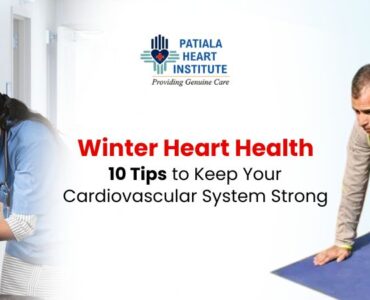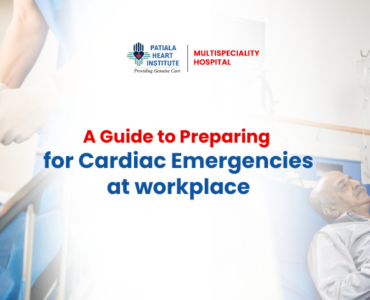In the midst of a career, family, and social obligations, you may keep forgetting or neglecting one crucial aspect – your heart health check.
The fast-paced, high-stress lifestyle that comes with being a busy professional can inadvertently lead to neglecting our well-being, particularly the health of our heart.
In the midst of deadlines, meetings, and the never-ending to-do lists, dedicating time to care for your heart might seem like a luxury. However, the reality is that a healthy heart is not a luxury but a necessity, forming the cornerstone of a productive, fulfilling life.
In this blog, we will explore the importance of heart health, the impact of a hectic lifestyle on the heart, and practical strategies to strike a balance between work and cardiovascular well-being.
Understanding Heart Health
The heart is your body’s powerhouse, responsible for pumping blood and oxygen throughout the body, providing the necessary fuel for every function. Cardiovascular health refers to the efficiency and effectiveness of the heart and blood vessels in performing this critical task.
When we talk about heart health, we often discuss risk factors such as high blood pressure, high cholesterol, smoking, obesity, and physical inactivity. These factors can contribute to the development of various cardiovascular diseases, which may manifest as conditions like heart attacks, strokes, or other cardiac issues.
The Impact of a Hectic Lifestyle on Heart Health
Busy professionals face several stressors every day, ranging from tight deadlines to long working hours and a sedentary lifestyle. These demands of the working lifestyle can lead to neglecting proper nutrition, regular exercise, and adequate sleep – the three pillars of a healthy heart.
Chronic stress, lack of physical activity, poor dietary choices, and insufficient sleep can elevate blood pressure, increase cholesterol levels, and impact overall heart health negatively.
Moreover, stress can trigger the release of adrenaline and cortisol, often referred to as stress hormones. Prolonged elevation of these hormones can have adverse effects, causing inflammation, damage to blood vessels and the heart, and escalating the risk of heart disease. Hence, finding a balance between the demands of a career and a healthy lifestyle is paramount for long-term heart health.
Managing Stress for a Healthy Heart
The demanding nature of the professional career often results in high levels of stress. Managing stress effectively is crucial for heart health. Here are some strategies to help you reduce work-related stress:
- Prioritize Time Management: Use tools like calendars and to-do lists to organize your day efficiently. This will reduce the feeling of being overwhelmed by tasks.
- Practice Mindfulness and Relaxation Techniques: Incorporate mindfulness and relaxation techniques into your daily routine.
- Exercise Regularly: Physical activity is an excellent stress reliever. Even a short workout can help you blow off steam and relax.
- Take Frequent, Short Breaks: Don’t forget to take short breaks during your workday. A quick walk or a few moments of deep breathing can refresh your mind and reduce stress levels.
- Ensure Adequate Sleep: Ensure you get enough quality sleep each night. Lack of sleep can increase stress levels and impair your ability to think clearly.
- Limit Distractions: Identify and minimize distractions at work, such as unnecessary meetings, excessive email checking, or social media use. Use apps or techniques to stay focused.
Incorporating Physical Activities Into Your Busy Schedule
Regular physical activity is a cornerstone of heart health. It helps maintain a healthy weight, strengthens the heart muscle, and reduces the risk of heart disease. However, finding time to exercise can be challenging for busy professionals. Here are some tips to incorporate with best exercises for heart health into your busy workday:
- Prioritize Exercise: Treat exercise as a non-negotiable part of your daily routine. Schedule it into your calendar, just like you would any other important appointment.
- Short and Intense Workouts: High-intensity interval training (HIIT) and circuit workouts can be very effective and time-efficient. These workouts can be completed in as little as 15-30 minutes.
- Desk Exercises: Incorporate simple exercises at your desk, such as seated leg raises, desk push-ups, or seated marches, whenever possible. These can help break up long periods of sitting.
- Morning Exercise: Consider working out in the morning before your day gets too busy. It can boost your energy levels and set a positive tone for the rest of the day.
- Stairs Over Elevators: Whenever you have the option, choose the stairs instead of the elevator or escalator. Climbing stairs is a great cardiovascular workout.
- Weekend Activities: Use your weekends wisely by engaging in more extended physical activities like hiking, cycling, or playing sports with friends or family.
- Home Workouts: If you can’t get to the gym, invest in basic workout equipment or follow online workout videos to exercise at home. Bodyweight exercises, yoga, and Pilates are good options.
- Lunchtime Walks: Use your lunch break to go for a brisk walk. Invite a colleague to join you for added motivation.
Making Heart-Healthy Dietary Choices
In addition to exercise, your diet plays a significant role in maintaining cardiovascular health and preventing heart diseases. Here are some tips for making heart-healthy dietary choices, even when you’re pressed for time:
- Add More Fruits and Vegetables Into Your Diet: Aim to fill half your plate with fruits and vegetables. They are rich in vitamins, minerals, fiber, and antioxidants that promote heart health.
- Choose Whole Grains: Opt for whole grains like brown rice, quinoa, whole wheat pasta, and whole-grain bread instead of refined grains. Whole grains are higher in fiber and nutrients.
- Limit Saturated and Trans Fats: Reduce your intake of saturated fats found in red meat, full-fat dairy, and fried foods. Avoid trans fats commonly found in many processed and fried foods.
- Opt for Healthy Fats: Incorporate sources of healthy fats like avocados, nuts, seeds, and fatty fish into your diet. These fats can help reduce bad cholesterol levels.
- Choose Lean Proteins: Select lean protein sources such as beans, legumes, tofu, skinless poultry, and lean cuts of meat and fish. Limit consumption of processed and red meat.
- Limit Added Sugar: Reduce your intake of foods and drinks high in added sugars, such as sugary beverages, candies, and pastries. Check food labels for hidden sugars.
Ensuring Adequate Sleep into a Busy Schedule
Ensuring adequate sleep is crucial for a healthy heart, especially for busy professionals with demanding schedules. Here are some tips to help you prioritize sleep and improve your heart health:
- Establish a Sleep Schedule: Try to go to bed and wake up at the same time every day, even on weekends. Consistency helps regulate your body’s internal clock.
- Create a Bedtime Routine: Develop a relaxing pre-sleep routine to signal to your body that it’s time to wind down. This might include activities like reading a book, taking a warm bath, or practicing relaxation exercises.
- Limit Screen Time Before Bed: The blue light emitted by smartphones, tablets, and computers can interfere with your sleep. Avoid screens at least an hour before bedtime.
- Create a Comfortable Sleep Environment: Ensure your bedroom is conducive to sleep. Keep the room dark, quiet, and at a comfortable temperature. Invest in a comfortable mattress and pillows.
- Avoid Heavy Meals and Caffeine Close to Bedtime: Eating large meals and consuming caffeine late in the day can disrupt your sleep. Aim to finish eating at least 2-3 hours before bedtime.
- Limit Alcohol and Nicotine: Both alcohol and nicotine can interfere with sleep patterns. Try to avoid them, especially in the hours leading up to bedtime.
- Limit Naps: Short power naps can be refreshing, but long daytime naps can interfere with nighttime sleep. If you need to nap, keep it under 30 minutes and avoid napping late in the day.
- Limit Work-Related Activities Before Bed: Avoid working on your laptop or engaging in stressful work-related tasks the hour before bedtime. This can help your mind relax.
Prioritizing Regular Health Check-ups
No matter how busy your professional life gets, never neglect routine health check-ups. Regular check-ups can detect potential heart issues early and help you take preventive measures. Here’s how you can prioritize health check-ups:
- Schedule Appointments in Advance: Plan your annual check-ups well in advance and block off time in your calendar to ensure you don’t miss them.
- Use Reminder Apps: Set up reminders on your smartphone or calendar app to ensure you don’t forget your appointments.
- Lunchtime Appointments: Schedule your appointments during lunch breaks or immediately before or after work. This minimizes disruptions to your workday.
- Block Off Time: Treat your health check-ups like important meetings. Block off the necessary time in your calendar and avoid scheduling work-related activities during those hours.
- Plan Ahead: Prepare for your appointments in advance. Have any necessary paperwork, questions, or concerns ready to discuss with your healthcare provider to make the most of your time.
Balancing Work and Personal Life for Heart Health
Balancing work and personal life is essential for maintaining heart health and overall well-being. Here are five tips to help you strike that balance and protect your heart:
- Set Boundaries: Establish clear boundaries between work and personal life. Avoid checking work emails or taking work calls during your downtime.
- Delegate and Collaborate: Don’t hesitate to delegate tasks and collaborate with colleagues to reduce your workload when necessary.
- Take Regular Breaks: Ensure that you take regular breaks during the workday to recharge and refocus.
- Time Management: Use effective time management strategies, like prioritizing tasks, setting realistic goals, and delegating when possible to prevent overworking and minimize stress.
- Stay Hydrated: Drink plenty of water throughout the day to stay hydrated, which is important for overall health.
Conclusion
For professionals with busy schedules, maintaining heart health may seem like a daunting task. However, with commitment and the right strategies, it is possible to strike a balance between your work and well-being.
At Patiala Heart Institute, we understand the unique challenges busy individuals like you face. That’s why we’re here to offer a crucial solution: prioritizing your heart health through regular check-ups and consultations with our team of renowned heart specialists in Patiala.
With a team of the best cardiologists in Patiala, we are dedicated to ensuring that your heart receives the specialized care it deserves.
Don’t wait for the signs of heart trouble to appear. Take proactive steps to safeguard your heart’s health today. Schedule a consultation with our heart specialists at Patiala Heart Institute today!
How Often Should I Undergo Heart Check-ups?
The frequency of heart check-ups can vary based on your age, medical history, risk factors, and your healthcare provider's recommendations. However, a general guideline is to have a heart check-up at least annually, especially if you're over 40 years old or have existing risk factors for heart disease.
It Is Difficult To Maintain A Heart-healthy Diet Due To My Hectic Work Schedule. How Can I Overcome This Challenge?
Balancing a busy work schedule and maintaining a nutritious diet can be challenging. With some planning and preparation, you can overcome this hurdle. Here are some tips to help you maintain a heart-healthy diet:
- Plan your weekly diet during the weekends
- Prepare and pack a heart-healthy lunch the night before work.
- Keep heart-healthy snacks like fresh fruit, nuts, yogurt, or whole-grain crackers at your workplace.
- Try to avoid oversized portions at restaurants or when ordering takeout. You can also use smaller plates and containers at home to help control portions.
- Limit processed and convenience foods







